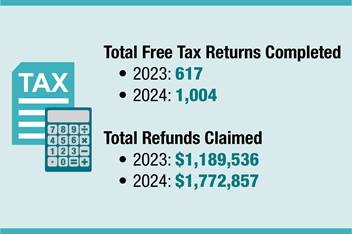Did the Enhanced Child Tax Credit Impact Adolescent Depression?

In 2021, the federal Child Tax Credit was temporarily enhanced as part of the COVID-19 American Rescue Plan. For that tax year, eligibility was expanded to include families who previously did not earn enough to qualify for the Child Tax Credit. The credit was also made fully refundable and was structured so families received the refund through monthly payments.
The Child Tax Credit enhancement offered increased financial stability for many families. For families earning less than $30,000 in annual gross adjusted income, the credit alone could supplement their annual income by as much as 20%.
In a recent study, researchers at Nationwide Children’s Hospital analyzed the impacts of this pandemic-related financial relief on children’s health outcomes, specifically adolescent depression.
“The enhanced Child Tax Credit was a monumental shift in policy,” says Laura Chavez, PhD, MPH, Principal Investigator with Nationwide Children’s Center for Child Health Equity and Outcomes Research. “It was the federal government’s first experiment with monthly cash payments to families with children.”
While researchers have studied the impact of this kind of relief on caregivers, there isn’t much data on how it impacts children – particularly older children.
“We know that parent stress has an impact on child mental health,” explains Chavez. “We suspected this relief could reduce stress for families and translate to mental health benefits for their adolescents.”
The team analyzed depression screenings for adolescents whose families were likely to have received the enhanced Child Tax Credit, as well as those who were not because their child had aged out of eligibility that year. Nationwide Children’s Hospital and its Primary Care Centers collected the depression assessments on an ongoing basis throughout the year.
Chavez explains that Nationwide Children's is especially well-placed to conduct this kind of research.
“We are committed to understanding how policy changes might address some of the long-standing disparities that exist in our community,” explains Chavez. “We were able to analyze what the enhanced Child Tax Credit meant for our patients in real time through the large amount of data in our health system.”
The study shows that the enhanced Child Tax Credit significantly reduced the probability of a positive depression screen for adolescents who were publicly insured as well as non-Hispanic Black adolescents.
Chavez’s report theorizes that the monthly Child Tax Credit payments reduced financial strain for these families, which in turn reduced stress for their teens.
“We know that struggling to meet basic needs increases caregiver stress, which can negatively impact child mental health,” she says. “Research has established that financial relief results in significant decreases in depression and anxiety for caregivers with children.”
According to Chavez, this study adds to a growing body of research demonstrating how our country can effectively combat child poverty.
“We know how to address child poverty,” she says. “The Child Tax Credit is an effective tool to reduce a severe adverse experience in childhood that can have lifelong impacts.”
The enhanced Child Tax Credit was not renewed after the 2021 tax year. Chavez believes families and their children would continue to benefit if the policy was reinstated.
“Our priority should be addressing child poverty as an upstream determinant of health outcomes,” says Chavez. “An extension of the enhanced Child Tax Credit would be a worthy investment.”
Chavez continues to research the tax credit’s impact on adolescent depression. This year, she and her team conducted focus groups with families to talk about how they spent the enhanced Child Tax Credit and how they believed it impacted their mental health.
Chavez is also leading a National Institutes of Health-funded study analyzing how the tax credit impacted the mental health of Medicaid-enrolled adolescents across several states.
“We know depression affects a lot of adolescents in our population,” she says. “Policies like the enhanced Child Tax Credit might make an impact before things have escalated to the point of needing acute care.”
Published September 2024

“We know that struggling to meet basic needs increases caregiver stress, which can negatively impact child mental health. Research has established that financial relief results in significant decreases in depression and anxiety for caregivers with children.”



